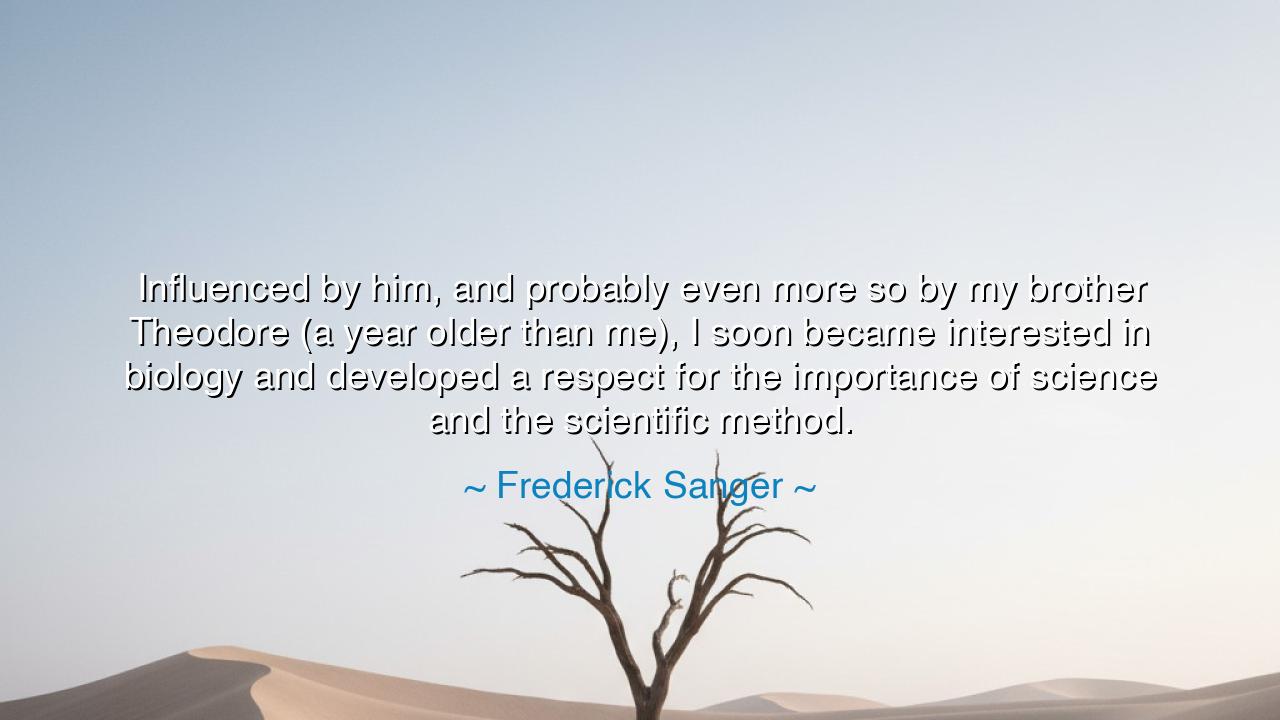
Influenced by him, and probably even more so by my brother
Influenced by him, and probably even more so by my brother Theodore (a year older than me), I soon became interested in biology and developed a respect for the importance of science and the scientific method.






In the words of Frederick Sanger, one of the great architects of modern science, there resounds a quiet humility: “Influenced by him, and probably even more so by my brother Theodore (a year older than me), I soon became interested in biology and developed a respect for the importance of science and the scientific method.” Within this simple remembrance lies a profound truth — that inspiration often comes not from fame or fortune, but from the intimate bonds of family, from the gentle sparks lit by those who walk beside us. Sanger’s reflection is not the boast of a man who conquered the frontiers of knowledge, but the gratitude of one who remembers where the journey began.
Born in 1918 in England, Frederick Sanger would go on to become one of only four individuals in history to receive two Nobel Prizes, both in Chemistry. Yet his words remind us that even the mightiest oak begins as a seed nurtured by others. His fascination with biology did not spring forth fully formed; it was planted by the example of his father, a physician, and watered by the curiosity he shared with his older brother, Theodore. Together, they explored the natural world — the small miracles of plants, the mysteries of living things — and through this companionship, Sanger learned that science was not merely knowledge, but a way of seeing. It was the discipline of patience, the worship of truth, the sacred practice of questioning that lifts the veil from the unknown.
In this quote, Sanger speaks of respect for the scientific method, and this respect is the foundation of all human progress. For to respect science is to respect honesty — the willingness to admit error, to follow evidence wherever it leads, even when it humbles pride or overturns belief. The ancients spoke of philosophia, the love of wisdom; in Sanger’s time, that love had become the scientific spirit, a devotion to understanding the laws of nature without deceit or vanity. It is a discipline of the soul as much as of the mind. Through such reverence, Sanger discovered not only the structure of proteins and DNA, but also a moral code — the idea that truth is sacred, and that all discovery must serve life, not dominate it.
To understand the meaning of Sanger’s words, one must look to the age in which he lived — a time when the world stood between destruction and discovery. He began his studies as the shadow of the Second World War darkened the earth, when science itself had been turned into both weapon and wonder. Out of that era came men and women who sought to restore science’s soul — to make it once again a force for healing rather than harm. In the quiet halls of laboratories, people like Sanger labored not for glory, but for understanding, guided by the scientific method as a compass through chaos. And from his work came a revolution: the sequencing of insulin, the deciphering of DNA, and the unlocking of life’s hidden language.
History offers many parallels to this humble beginning. Isaac Newton, reflecting on his own discoveries, once said, “If I have seen further, it is by standing on the shoulders of giants.” But Sanger’s giants were not kings of science — they were his father and his brother. His legacy reminds us that greatness often grows not from ambition, but from influence — the quiet encouragement of those who show us how to look at the world with wonder. Just as a teacher lights a candle in the mind of a student, so too did Theodore and his father kindle in Sanger the flame of inquiry. That flame, once lit, burned not for himself, but for all humanity.
There is a deep moral in this quote — that inspiration is a sacred chain, passed from one generation to another. The mentor inspires the student; the brother inspires the brother; and through that chain, civilization advances. We who inherit their work must remember that science is not cold logic, but a form of reverence — reverence for truth, for nature, for the fragile miracle of life. Sanger’s respect for the scientific method was not worship of technique, but of honesty — a belief that the search for truth ennobles the human spirit.
So, my children, take this lesson to heart: seek truth with humility, and honor those who light your path. Be curious as the young Sanger was curious, respectful as he was respectful, and steadfast as he was steadfast. The world does not need more cleverness — it needs sincerity, patience, and courage. Let your discoveries, whether small or great, be guided by reverence for the truth, and let your respect for knowledge begin with gratitude for those who first showed you the stars. For as Sanger’s life teaches us, the pursuit of truth begins not in the laboratory, but in the heart — and the first experiment of the scientist is to learn to see with wonder.






AAdministratorAdministrator
Welcome, honored guests. Please leave a comment, we will respond soon